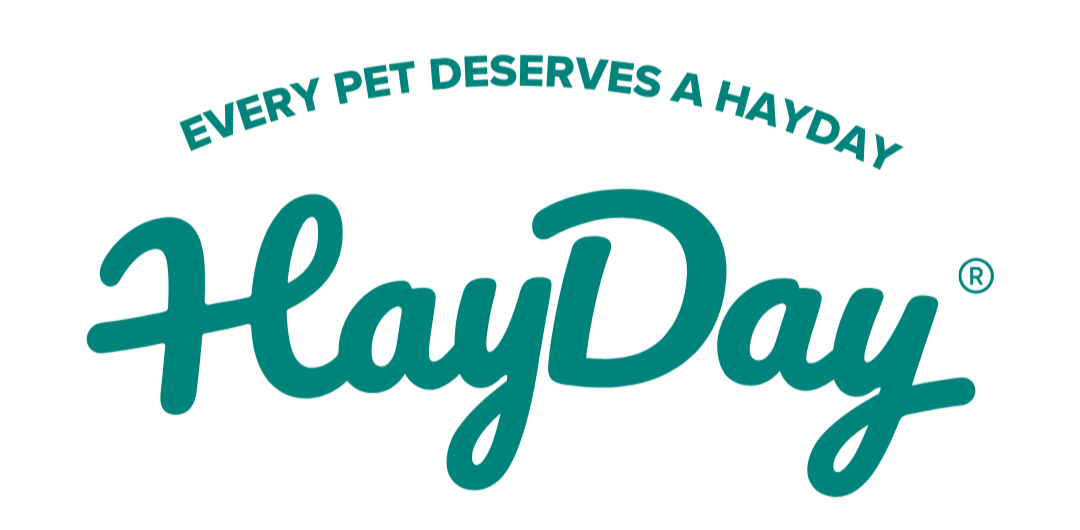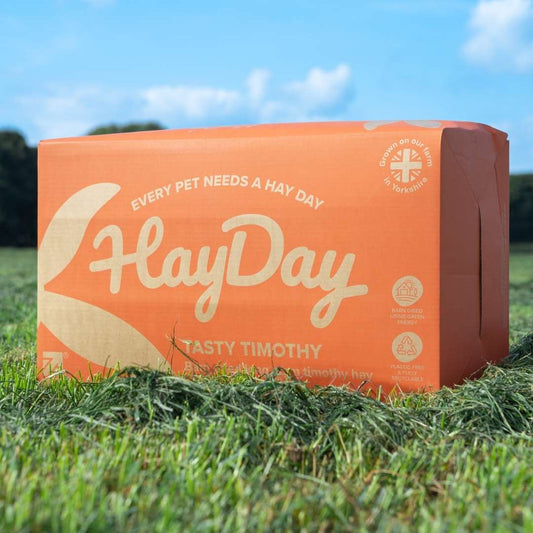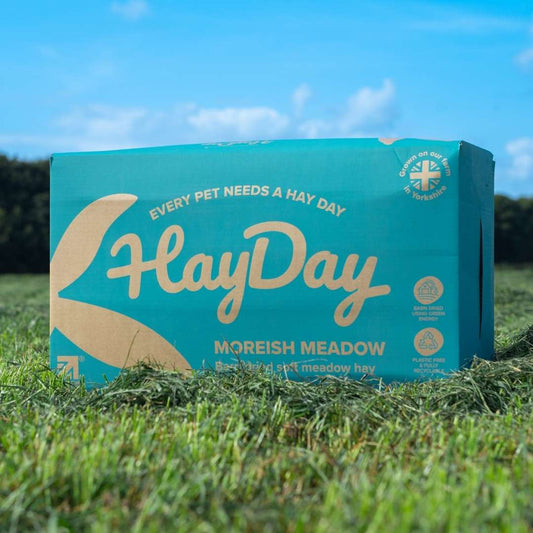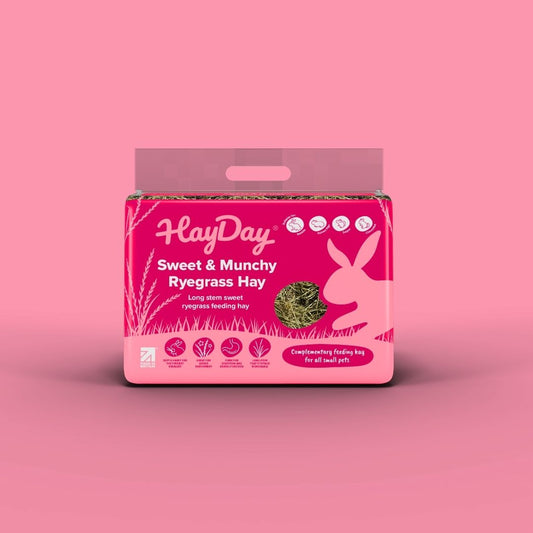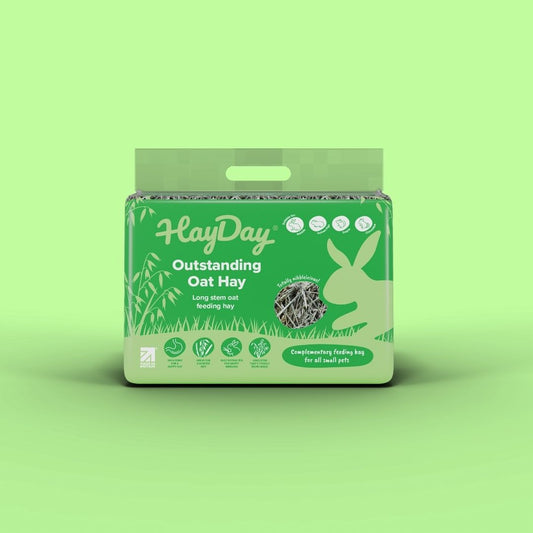Frequently checking your rabbit's gum and dental health can play a key role in providing your pet rabbit live a happy and healthy life. But if you’re new to owning a rabbit, you might be wondering: how do I keep their teeth healthy?
Although it may be difficult to check your rabbit's teeth at times - paws up, who's been there? It is extremely important for you to regularly check their teeth (as frequent as once a week), alongside your rabbit's 12 monthly veterinary appointment, as their teeth grow continuously.
Here at HayDay, we have created a helpful guide to address your need-to-knows on your rabbits dental health. With the help of our expert nutritionist Briony, our guide will explore:
-
Signs that your rabbits teeth are healthy - or not
-
How many teeth rabbit have (and the answer might come as a surprise to you)
-
The key symptoms to look out for
-
How to care for your rabbit's mouth and teeth
-
The correct food to feed which equals healthy teeth!
Shop now > High fibre hay to support your rabbits teeth

How To Keep Rabbit Teeth Healthy
Maintaining your rabbit's teeth can be relatively quick and does not require extra effort on the part of your healthy bunny or you - unless they don't want to co-operate (but don't worry, we've all been there)!
Signs Your That Bunny's Teeth are Fine - or Not
Gum and dental problems are commonly associated with a poor diet, specifically a lack of fibre (and an overreliance on cereals). Natural coarse stems found in a premium hay (most often Timothy Hay), will help to assist your rabbits with the maintenance of healthy dental function.
Keep in mind that rabbits are predators in the wild, so any signs or weaknesses makes these animals targets. Both wild and domestic pet rabbits are instinctively keen on hiding any pain - and as a bun-mum or bun-dad - you must look for the signs that the animal is suffering. Some of the key signs and symptoms include:
-
Overgrown teeth
-
Weight loss
-
A dirty bottom
-
Diarrhoea or soft and irregular faeces
-
Loss of appetite
'Stemmy' fibre from long-stem Timothy Hay will naturally encourage a correct chewing action, and therefore promote your rabbit's dental health. For advice on further signs and symptoms of dental issues in rabbits, keep reading our helpful guide.
How Many Teeth Do Rabbits Have?
Did you know that rabbits have 28 teeth?
According to The National Welfare Association and Fund :
Rabbit's “back teeth, the molars, are used for grinding down on hay. The upper molars are spaced so they are slightly overlapping the lower molars towards the cheeks. The combination of incisors and ‘peg teeth’ is only found in lagomorphs. Each of the two upper incisors has a ‘peg tooth’ behind. When the mouth is closed, the lower incisors slot between the front incisors and the peg teeth. The teeth rub against each other, keeping both upper and lower incisors chisel-sharp.”
Why Is It Important Keep To My Rabbit's Teeth Trimmed?
As rabbits teeth never stop stop growing, it's important that they're constantly chewing to keep them worn down. Noticing, even the slightest, behavioral changes in your rabbit can be a sign of poor dental health. It's important for you to pay careful attention to your rabbit.
GI Stasis
By keeping your rabbit constantly chewing, you're also preventing them from entering the early stages of gastrointestinal stasis.
GI Stasis occurs when your rabbit isn't getting the correct amount of fibre in their diet (not eating enough hay!), and can be fatal in some cases.
Click here > To find out more about GI Stasis in Rabbits, plus how to prevent it.
Key Symptoms of Dental Issues in Rabbits
There are many symptoms of dental issues/diseases in rabbits. Here’s what the PDSA recommends looking out for:
-
Overgrown teeth
-
Weight loss
-
A dirty bottom
-
Diarrhoea or soft/irregular faeces
-
Weeping eyes
-
Drooling
-
Reduced appetite
-
Tooth grinding
-
Low energy
-
Smelly breath
How Do You Care For A Rabbit's Teeth?
It's not necessary to physically clean your rabbit's teeth, but their are certain foods and activities that will help with their daily dental care. Make sure you're feeding your bunny food that encourages them to chew, and in turn will help reduce the likelihood of tooth pain.
Regular Vet Check Ups
The occurrence of malocclusion in rabbits may require dental treatment and frequent visits to vets. The malocclusion procedure is painful to the animal and your veterinarian may advise you to simply remove the impacted tooth. Ideally, you would have your rabbits teeth checked frequently at the vets - however if this isn't possible - once a year is a minimum.
What Food Will Help My Rabbits Teeth?
Generally, a high fibre diet will help keep rabbits chew their ever-growing teeth in tip-top condition. Follow the recommended rabbit diet set out by The Rabbit Welfare Association and Fund.
We spoke to our in-house nutritionist Briony on her top-tips on keeping your rabbit's teeth healthy:
“Rabbits have teeth which are known as hypsodont, meaning they are designed to erupt continuously as they are worn down by a high fibre diet. As such, the key to maintaining healthy teeth for your rabbit starts with ensuring adequate and appropriate fibre provision. Forage (grass and/or hay) should represent most of your rabbit’s diet (~80%) to maintain healthy digestive and dental function. Insoluble fibre is key to helping to promote healthy teeth and tummies and is contained within the coarser parts of a plant. While rabbits may naturally seek out less mature (more palatable!) fresh grass, some stemmy forage in the ration is essential (ideally around 20% of their fibre intake)".
Provide Fresh Hay
It is simple and effective to keep your rabbit's teeth from becoming overgrown by using a premium hay choice.
By feeding your rabbit a high fibre and long stem hay this will become a good source of nutrition as well as a tool in the process of helping keep your rabbits teeth stay healthy. Remember, in the wild, rabbits eat grass and other vegetation and chew the organic materials they eat. Generally speaking, it can be harder to replicate this diet with pet rabbits, which is why offering the correct food is extremely important to their wellbeing.
The highest fibre hay choice for your rabbit would be Timothy Hay as its coarse and the long stems are the perfect aid to keep your rabbits teeth and mouth - in great condition.
Introduce Chew Toys For Rabbits
As addressed earlier in our expert guide - rabbits like chewing.
It's a good idea for them to chew at their own pace - all the time - which is important because it helps prevent tooth decay, dental disease and infection. If your rabbit has no toys or gets bored of them easily, you may find them stealing your home furniture which is why it is great to rotate new toys occasionally so that your rabbit is kept well occupied.
Try using:
-
Cardboard boxes
-
Foraging mats
-
Digging boxes
Read our guide on how to encourage your rabbit and other small animals to forage.
Other Food That Will Help Your Rabbit's Teeth
Alongside your rabbit's regular base diet which will naturally help with their teeth, you can also introduce these activities to help wear down your rabbit's front teeth further:
-
Twigs and branches
-
Fresh vegetables and herbs
-
Enrichment toys
*Always ensure that any twigs, branches or chew toys are safe and not poisonous to your rabbit before feeding them.
Summary
By following rabbit feeding guidelines, you are helping to assist with your small pet's dental health. Your rabbit's staple diet should be:
-
(Approximately) an egg-cup full of pellets
-
A handful of leafy vegetables/greens
We would always recommend that you consult your exotic vet if you’re worried about potential issues with your rabbit’s teeth. As a rabbit owner, you know your furry friend better than anybody - so always get any issues that you're concerned with, checked out!
Relevant Advice
Dental Problems in Rabbits - PDSA
Rabbit Dental Problems - The National Rabbit Association & Fund
